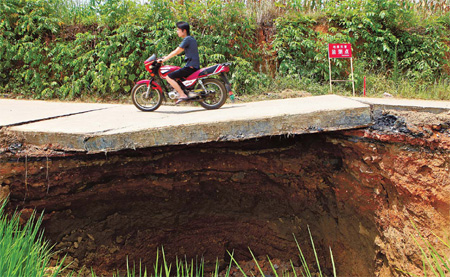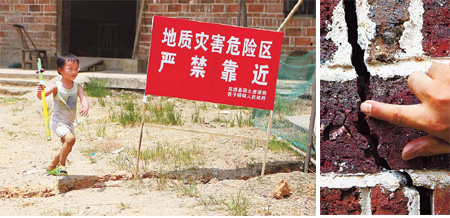Focus
When the land caves in
By Wang Yan in Hunan and Jiang Xueqing in Beijing (China Daily)
Updated: 2010-08-30 11:31
 |
Large Medium Small |
|
 A villager rides on a road beside a large sinkhole in Hutang village, Hunan province. Sinkholes have plagued provinces and regions across the country this year and have so far led to the resettlement of hundreds of villagers. Photos by Zhang Tao / China Daily |
Geologists probe the sinkholes causing misery for farmers. Wang Yan in Hunan and Jiang Xueqing in Beijing report.
Liu Yongfan is still haunted by the memory of his house being jolted and torn apart.
Shaken awake by a thunderous rumbling, the farmer could only watch on helplessly with his neighbors in Hutang village as the shifting earth destroyed their homes.
"When I felt the tremors at about 3:40 am, I immediately woke my wife, child and parents up," he said, the fear still visible in his eyes. "I yelled at them to get out of the house and into the yard."
Residents crowded together on the streets until sunrise when they finally got a chance to assess the damage.
Liu's two-story home, which he built himself, was riddled with deep cracks that snaked along the floors and walls.
Although there were no casualties, more than 160 houses were damaged in the incident, leaving 866 people homeless, said Wu Changjiang, vice-director of the information department for Shuangfeng county, Hunan province.
"At the time, many of us thought it was an earthquake," added Liu, who is in his 30s.
According to government experts who arrived the following day, however, they were wrong. Investigations later revealed the July 25 destruction was actually the result of mining, which caused a series of sinkholes.
Known as tiankeng, or heavenly pits, sinkholes have brought havoc to several Chinese provinces, including Sichuan and Zhejiang, since late April.
"The surface collapses (in Hutang) were from the giant goaf area underneath (the village), which resulted from activities by Shuangfeng Gypsum Mine Ltd," said a report issued by staff at the provincial department of land and resource.
Sinkholes opened up in homes and on farmland, while traffic was initially unable to pass the huge clefts carved in the village's roads.
About 40 hectares of farmland was affected, including severe damage to 15 kilometers of irrigation channels and 47 reservoirs, according to figures provided by Wu. Many rice fields also drained, causing seedlings to starve in the heat.
Water and electricity supplies to the village were both cut off and 215 wells dried out.
Underground work
The Shuangfeng mine allegedly at the center of the problem was operating under all the required documents before the incident, said Wu.
Five days before the sinkholes opened, bosses halted production to comply with restrictions during the busy harvest season. Officials confirmed it has now been closed until further notice.
Chen Jianxin, Party secretary for Hutang, named the mine owner, Huang Zanfu, who lives in the county but spends most of his time traveling to other cities. Many villagers said they have never met him.
China Daily reporters could not reach Huang for comment.
Liu used to work at the mine as a driver transporting gypsum, a common mineral often used as an ornamental material. He said he was not surprised when he heard about the experts' report and claimed the facility had been "operating illegally for a long time".
"About 10 to 20 villagers worked there," he said. "Miners felt that some of the operational methods were violating the rules."
Regulations require 16-meter-wide shafts to be separated by a 4-meter support area. Yet, at the Shuangfeng mine, shafts were often more than 30 meters wide, while the support areas were about 1 meter, said Liu.
"The county government sent a team of experts to inspect the mine seven years ago," he added. "They asked the bosses to build some artificial pillars (in the shafts) but they didn't."
According to Chen, the mine was a State-run company until it was contracted to a private company in 2003. "That's when the problems started. The reports we submitted are now this thick," he said, gesturing with his hands to show a pile of papers 30 centimeters tall.

"We could often hear the underground blasts at home," he said, adding the mining operators use eight tons of explosives every month and collect more than 20,000 tons of gypsum each year.
Wu said county authorities would wait for more comprehensive surveys before commenting about the mine's alleged violations. "The geological environment is not steady, so experts can't go underground just yet," he said, adding that the area will be unstable for another few months.

Villagers like Chen say their ancestors have lived in the area "since the first days of the Earth" and had experienced very few natural disasters.
"Now it's virtually uninhabitable," said the Party secretary. "We're worried about the future and whether the county would have enough money to relocate so many people."
Wu, who shared his concerns, estimated a mass relocation program could cost up to tens of millions of yuan.
"The county certainly doesn't have that much money," said the information official, who revealed that the Shuangfeng People's Court immediately issued a "property preservation" order on the mine, meaning its profits and assets could be used for disaster relief.
"There are lots of coal mines in the county," he added. "Some collapses have happened near mines before but they were never as serious as this one."
Shuangfeng is officially listed as below the national poverty line but is rich in mineral resources, leading Hunan in coal, limestone, gypsum, granite and gold reserves.
In 2004, the county had 87 mining operation units, according to an economic census report published on the county government's website.
Moving problems
All of the affected villagers, including Liu and Chen, are now living in tents provided by the authorities. Each person is also receiving drinking water and a daily subsidy of 10 yuan ($1.5) and two coal balls.
"It's too hot to stay in the tent during the day; it's like a steam box," said Liu. "We've sent our child and parents to stay with relatives. Only my wife and I sleep in the tent. We hope to have our own home soon."
Sinkholes have forced the resettlement of hundreds of villagers this year and also sparked fears they may herald more natural disasters in the near future.
On May 27, farmers in Xinchang town, Sichuan, found a sinkhole in a rice field that was almost 2 meters deep. A probe by technicians from the Sichuan Institute of Geological Engineering found groundwater exploitation was the cause.
Less than 50 meters away was a well that was used to supply a huge amount of water for production to an iron casting company. As excessive pumping of groundwater removes sand and dirt away, the land grew hollow and finally collapsed, explained Yang Biaoshan, one of the geological engineers on the investigation team.
Sinkholes have also plagued the province's Changning county, with 27 of them reported in eight days starting April 27. The diameter of the largest hole was 60 meters, according to a report in the Chengdu Commercial Daily.
Farmer Chen Fenmo, who lives just 30 meters from a hole, said he stayed up all night in the courtyard, holding his ID card and money, ready to run away in case of further collapses.
Officials with the land and resources bureau in Yibin, which covers Changning, revealed the sinkholes were spread across an area of 600,000 square meters and impacted 290 people, who were forced to move in with relatives or sleep in tents provided by the government.
Initial investigations reportedly linked the incident to a complex distribution of karst caves in the area and suggested lowering groundwater levels may have loosened the soil. Experts have yet to make available the final results of the probe.
The definition of a tiankeng can differ depending who is giving it.
Geologists say they are more than 100 meters in both diameter and depth and caused by conditions that are tens of thousands of years in the making. Villagers, meanwhile, use the term for smaller sinkholes that are usually the result of human activities such as mining, tunneling and exploitation of groundwater, said Zhu Xuewen, a professor with the Chinese Academy of Geological Sciences' institute of karst geology.
"This kind of soil collapse (in Hutang) is very common," he said. "It takes place every year around the world. Guilin (in the Guangxi Zhuang autonomous region) alone has about 1,000 sinkholes on record."
Like many other geologists, he reassured the public that the sinkholes that have appeared recently have nothing to do with earthquakes.
To prevent further collapses, he suggested geological surveys be done thoroughly before construction projects are started to check the condition of the ground.